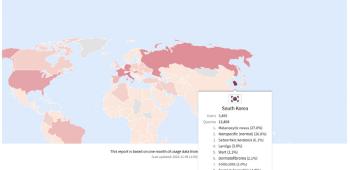Difficulties in all upper-level medical care at hospitals that do not participate in the regional cooperation system for pediatric care...Need to take measures such as intensive support
May 19, 2025
It was found that all advanced medical institutions for pediatric patients at pediatric and adolescent hospitals showed a stark difference depending on whether they participated in the pilot project of the regional cooperation system network for pediatric care.
While it is relatively easy for all pediatric patients at pediatric hospitals participating in the pilot project of the regional cooperation system network for pediatric care, pediatric hospitals that do not participate in this project are still struggling with all pediatric patients.
The Korea Pediatric Youth Hospital Association (Chairman Choi Yong-jae, head of Strong Children's Hospital in Uijeongbu) conducted a recognition survey from May 1 to May 16 by dividing it into two groups: a pediatric youth hospital participating in the pediatric care regional cooperation system network pilot project and a pediatric youth hospital not participating in it.
In a survey of doctors working at pediatric and adolescent hospitals who do not participate in the regional cooperation network pilot project, 202 people responded, with 18% saying they were rarely accepted. If 43% of the rate of intermittent acceptance was added, in fact, 61% of all advanced medical institutions for pediatric patients were unavailable. In other words, it is still difficult to power. It was 1% and 38% respectively that it was always accepted and generally accepted.
On the other hand, 15% of hospitals for children and adolescents participating in the regional cooperation system network pilot project were always accepted. In other words, if 75% of the proportion that is generally accepted is added to this, 90% of them were able to be used. It is analyzed that the pilot project of the regional cooperation system network of pediatric and adolescent hospitals is showing a positive effect in solving the problem of all people, as it is extremely small at 5% each.
The Ministry of Health and Welfare's ongoing measures to improve the pediatric medical system were generally negative, so they did not judge at all that the improvement of the pediatric medical system would take place if they believed it. In the field of pediatric medical care, it is interpreted that the Ministry of Health and Welfare strongly wants to turn the direction of the measures to improve the pediatric medical system currently being pursued to normalize pediatric medical care.
Choi Yong-jae, Chairman of the Korea Pediatric Youth Hospital Association, said "In this survey, we were able to assess the impact of the regional cooperation system network pilot project on all pediatric patients at pediatric youth hospitals.""The government and pediatric and adolescent-related organizations should make every effort to revive the collapsed pediatric medical system through intensive interest and support for the regional cooperation system for pediatric patients along with a comprehensive inspection of future pilot projects.""
In addition, it is true that the pediatric regional cooperation system network pilot project has a positive effect, but there is a limit to not taking into account the demand for patients in the medical living area (medical area) at all due to the setting centered on the administrative district"We need a comprehensive review of the policy direction" he added.
In particular, Chairman Choi Yong-jae said, `While the capacity of all hospitals participating in the pilot project for regional cooperation in pediatric care is virtually 100%, 61% of non-participating hospitals said that it is virtually impossible to do so, revealing that structural inequality is occurring in which children's lives change depending on whether they participate in the project.'
Chairman Choi then emphasized, "This survey is not just an investigation, but an emergency light that warns the reality that the survival potential of pediatric patients depends on the policy. It is not a limited approach at the pilot project level, but a task that the next government must elevate to a national policy."
On this day, Vice Chairman Lee Hong-joon (Director of Ai First Hospital Kimpo) also said, "There are many difficulties when treating pediatric patients due to the collapse of the pediatric medical system, but it is fortunate that the difficulties of all advanced medical institutions, which was one of the biggest concerns, have been resolved somewhat through the network pilot project, but pediatric treatment is still facing a crisis.""In addition to the development of the regional cooperation system network pilot project, it is imperative to develop reasonable and efficient policies to revive pediatric care and take countermeasures " he stressed.
While it is relatively easy for all pediatric patients at pediatric hospitals participating in the pilot project of the regional cooperation system network for pediatric care, pediatric hospitals that do not participate in this project are still struggling with all pediatric patients.
The Korea Pediatric Youth Hospital Association (Chairman Choi Yong-jae, head of Strong Children's Hospital in Uijeongbu) conducted a recognition survey from May 1 to May 16 by dividing it into two groups: a pediatric youth hospital participating in the pediatric care regional cooperation system network pilot project and a pediatric youth hospital not participating in it.
In a survey of doctors working at pediatric and adolescent hospitals who do not participate in the regional cooperation network pilot project, 202 people responded, with 18% saying they were rarely accepted. If 43% of the rate of intermittent acceptance was added, in fact, 61% of all advanced medical institutions for pediatric patients were unavailable. In other words, it is still difficult to power. It was 1% and 38% respectively that it was always accepted and generally accepted.
On the other hand, 15% of hospitals for children and adolescents participating in the regional cooperation system network pilot project were always accepted. In other words, if 75% of the proportion that is generally accepted is added to this, 90% of them were able to be used. It is analyzed that the pilot project of the regional cooperation system network of pediatric and adolescent hospitals is showing a positive effect in solving the problem of all people, as it is extremely small at 5% each.
The Ministry of Health and Welfare's ongoing measures to improve the pediatric medical system were generally negative, so they did not judge at all that the improvement of the pediatric medical system would take place if they believed it. In the field of pediatric medical care, it is interpreted that the Ministry of Health and Welfare strongly wants to turn the direction of the measures to improve the pediatric medical system currently being pursued to normalize pediatric medical care.
Choi Yong-jae, Chairman of the Korea Pediatric Youth Hospital Association, said "In this survey, we were able to assess the impact of the regional cooperation system network pilot project on all pediatric patients at pediatric youth hospitals.""The government and pediatric and adolescent-related organizations should make every effort to revive the collapsed pediatric medical system through intensive interest and support for the regional cooperation system for pediatric patients along with a comprehensive inspection of future pilot projects.""
In addition, it is true that the pediatric regional cooperation system network pilot project has a positive effect, but there is a limit to not taking into account the demand for patients in the medical living area (medical area) at all due to the setting centered on the administrative district"We need a comprehensive review of the policy direction" he added.
In particular, Chairman Choi Yong-jae said, `While the capacity of all hospitals participating in the pilot project for regional cooperation in pediatric care is virtually 100%, 61% of non-participating hospitals said that it is virtually impossible to do so, revealing that structural inequality is occurring in which children's lives change depending on whether they participate in the project.'
Chairman Choi then emphasized, "This survey is not just an investigation, but an emergency light that warns the reality that the survival potential of pediatric patients depends on the policy. It is not a limited approach at the pilot project level, but a task that the next government must elevate to a national policy."
On this day, Vice Chairman Lee Hong-joon (Director of Ai First Hospital Kimpo) also said, "There are many difficulties when treating pediatric patients due to the collapse of the pediatric medical system, but it is fortunate that the difficulties of all advanced medical institutions, which was one of the biggest concerns, have been resolved somewhat through the network pilot project, but pediatric treatment is still facing a crisis.""In addition to the development of the regional cooperation system network pilot project, it is imperative to develop reasonable and efficient policies to revive pediatric care and take countermeasures " he stressed.
|
This article was translated by Naver AI translator.














